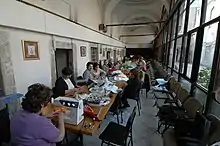Köprülü family
The Köprülü family (Turkish: Köprülü ailesi) was a noble family of Albanian origin in the Ottoman Empire.[1][2] The family provided six grand viziers (including Kara Mustafa Pasha, who was a stepson), with several others becoming high-ranking officers. The era during which these grand viziers served is known as the "Köprülü era" of the Ottoman Empire.
Another notable member of the family was Köprülü Abdullah Pasha (1684–1735), who was a general in Ottoman-Persian wars of his time and acted as the governor in several provinces of the empire. Modern descendants include Mehmet Fuat Köprülü, a prominent historian of Turkish literature. Members of the family continue to live in Turkey, Maghreb and the United States.
Köprülü grand viziers
During the history of the Ottoman Empire, the Köprülü grand viziers had a reputation for dynamism in a state that would later show signs of decline and stagnation. The early viziers in particular focused on military campaigns that extended the Empire's power. This, however, came to an end after the disastrous Battle of Vienna launched by Kara Mustafa Pasha, a member of the family (see also the Treaty of Karlowitz).

| Name | Life | Grand vizier in | Sultans |
|---|---|---|---|
| Köprülü Mehmed Pasha | 1583–1661 | 1656–1661 | Mehmed IV |
| Köprülüzade Fazıl Ahmed Pasha | 1635–1676 | 1661–1676 | Mehmed IV |
| Kara Mustafa Pasha1 | 1634–1683 | 1676–1683 | Mehmed IV |
| Abaza Siyavuş Pasha II2 | died 1688 | 1687–1688 | Suleiman II |
| Köprülüzade Fazıl Mustafa Pasha | 1637–1691 | 1689–1691 | Suleiman II Ahmed II |
| Amcazade Köprülü Hüseyin Pasha | 1644–1702 | 1697–1702 | Mustafa II |
| Köprülüzade Numan Pasha | 1670–1719 | 1710–1711 | Ahmed III |
1 Kara Mustafa Pasha had been adopted by the Köprülü family and was the brother-in-law of Köprülü Fazıl Ahmet Pasha.
2 Abaza Siyavuş Pasha was a servant of Köprülü Mehmet Pasha. By marrying his daughter, Siyavuş became a son-in-law (damat) of the powerful Köprülü family.
 Köprülü Grave
Köprülü Grave Köprülü mosque
Köprülü mosque Koprulu Complex courtyard
Koprulu Complex courtyard
See also
- Köprülü era of the Ottoman Empire
- Veles, a city in North Macedonia (named Köprülü under Ottoman rule)
- Vezirköprü, a Turkish town named after the family
References
- Stephen Schwartz, The other Islam: Sufism and the road to global harmony Doubleday 2008 ISBN 978-0-385-51819-2 page 100.
- Ivo Banac, The national question in Yugoslavia: origins, history, politics, ISBN 0-8014-1675-2, ISBN 0-8014-9493-1 Cornell University 1988 page 292.
.svg.png.webp)